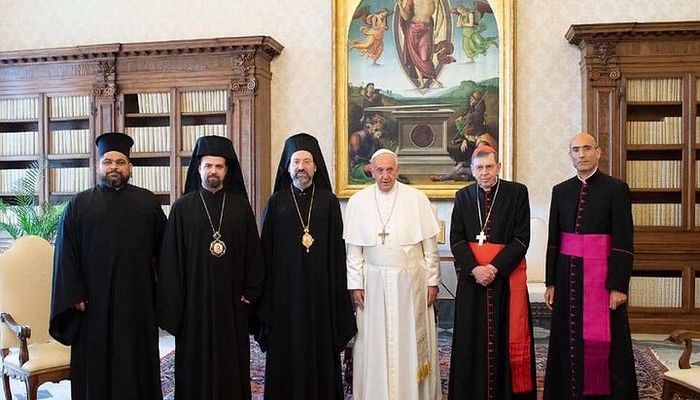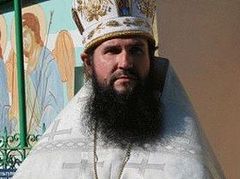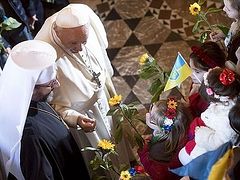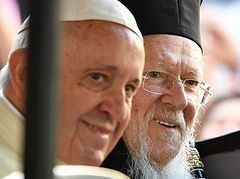Rome, July 1, 2019
On June 27, a Delegation from the Ecumenical Patriarchate, led by Archbishop Job (Getcha) of Telmessos, co-president of the Joint International Commission for the Theological Dialogue between the Roman Catholic Church and the Orthodox Church, Bishop Maximos of Melitene, and Deacon Vosporios Magafas, Codex Writer of the Holy and Sacred Synod of the Ecumenical Patriarchate, arrived in Rome to participate in the Thronal Feast of the Roman church. On 28 June, they took part in dialog with members of the Pontifical Council for Promoting Christian Unity.
Those following events concerning the Ukrainian Church may remember that prior to the canonical crisis, in 2016, while in Ukraine, Archbishop Job refused multiple times, requests to serve with Ukrainian schismatics, while he instead served with His Beatitude, Metropolitan Onuphry of Kiev and All Ukraine. That was then, however, and Archbishop Job’s position has now, along with his Patriarch of course, completely turned against the canonical church.
As seen here in English on the official site of the Ecumenical Patriarchate, as well as this Ukrainian article on the news site of the Vatican, both sides constantly stressed their desire for (eucharistic) communion. While we as Orthodox do of course pray for the union of all, this is always understood as the union of all to Orthodoxy; in other words, the heterodox receive Orthodoxy, but Orthodoxy does not unite to that which is not Orthodox. However, one can see this does not appear to be the union the two parties “desire” in the words of the Pope. Take this quote from Patriarch Bartholomew’s letter:
“Nevertheless, the restoration of communion between our Churches remains our sincere hope, the main object of our prayers and the goal of the dialogue of truth established between our Churches.”[1]
The phrase “main object of our prayers” seems highly concerning. To be fair, we don’t wish to misinterpret the words of Patriarch Bartholomew, as there can always be a language barrier, but it seems certain that salvation, a pre-requisite of which is keeping the unadulterated Orthodox faith, is the primary object of our prayers.
The Pope also made comments of a similar spirit, saying:
“I have been able to appreciate the spiritual richness present in Orthodoxy. I assure you that I left those countries with a greater desire for communion. I am increasingly convinced that the restoration of full unity between Catholics and Orthodox will come about through respect for specific identities and a harmonious coexistence in legitimate forms of diversity. The Holy Spirit, for that matter, is the one who creatively awakens a multiplicity of gifts, harmonizes them and brings them into authentic unity, which is not uniformity but a symphony of many voices in charity…”
Once again, there is a troubling notion that any doctrinal issues are just bothersome technicalities, and all that matters is we all love each other. But certainly we can love each other without being forced to agree with things against our faith, because love does not force.
In general, the theme here is unity, but Orthodox people have experienced what that unity actually took the form of, when we fell into its snares throughout history. Take for example the comments of the Ukrainian Uniate head Svyatoslav Shevchuk, who said:
“The point was that we did not build two different patriarchates, but sought to create a unified Kyivan Patriarchate, which would be recognized both by the Holy See in Rome and by Constantinople. We are aware that this kind of unity will be possible when the ecumenical process is crowned at the universal level by the restoration of Eucharistic communion between Rome and Constantinople.”
All this talk of unity sounds pleasant, and it was the same rose colored rhetoric Constantinople used to justify their invasion of Ukraine. However these are not the words of true Ukrainophiles, but actually people who either know very little about what the Uniates did to Ukraine, or those who would bring that kind of torture again on the pious Ukrainian people. One need only look to the lives of Saints who lived in and near the Ukrainian lands, such as the Carpatho-Russian Saints, like Saint Alexis Toth, whose life is another vivid example that the Unia was always seen by the Vatican as a stepping stone into full Roman Catholicism, and how the Latin rite elites despised the eastern rite to the core.
As Patriarch Kirill of Moscow has constantly stressed, “there can be no union for political convenience or under threat of schism”. His Holiness said this, siting the example of Saint Mark of Ephesus who opposed Union with Rome when practically the entire Patriarchate of Constantinople then supported it.
During the recent meeting with Rome, it seems there were no dissenting Orthodox voices.
Matfey Shaheen




